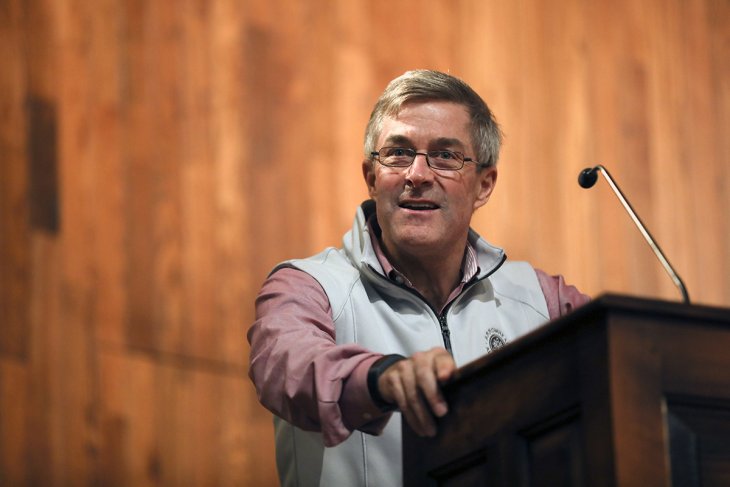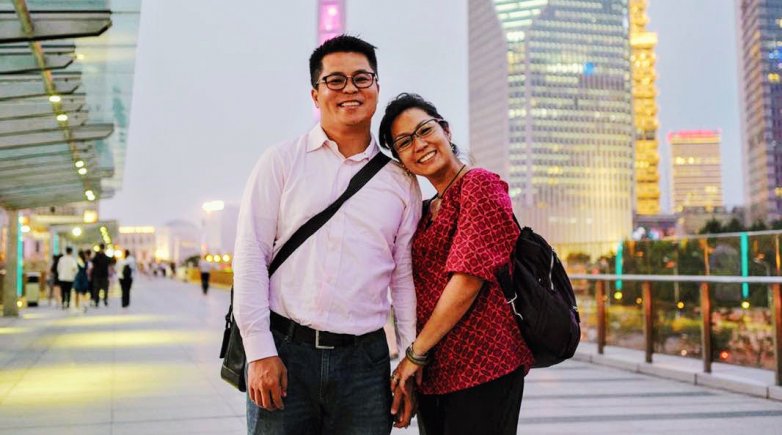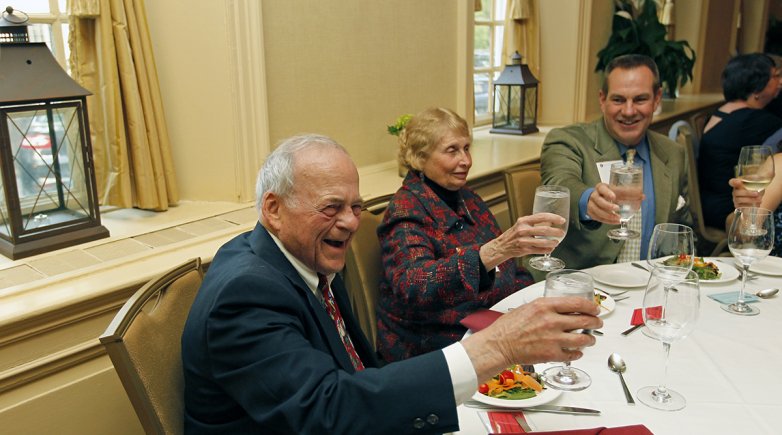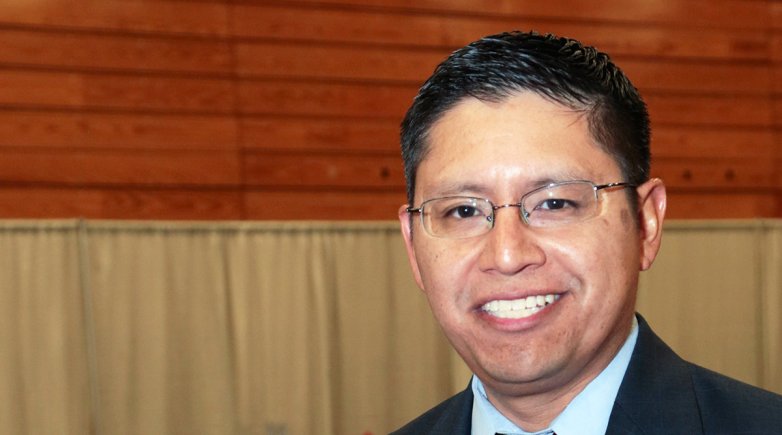Tony Downer

"Those who have come before will continue to enable those who come to Exeter in the future."
Tony Downer ’75; P’06, P’06, P’07 spent more than 30 years in private equity and venture capital investing in technology companies, with a particular question in mind.
“You’re always peering into the future,” he says. “You’re trying to answer the question of what lies on the horizon and beyond: How do you take action today, make decisions today, so as to anticipate and capture that future?”
It’s a mindset that’s served him well in his many volunteer roles for Exeter, actively and pragmatically supporting the Academy’s leadership through years of critical change and future-focused developments. Downer, who will step down after 13 years as an Academy trustee on June 30 — having also completed three years as that body’s president — has been integral to the Phillips Exeter Academy community in myriad ways.
His previous volunteer roles have included serving as class president and class reunions gifts chair and acting as the director and then vice president of the General Alumni Association. In addition, Downer has served on the Academy’s Investment Committee, and chaired the Governance Review Task Force and the Budget and Finance Committee. But it’s his recent leadership role he points to in terms of its noteworthy results. “One of the things I’m most proud of,” Downer says, “is the quality — in terms of character, integrity, competency, devotion and commitment — on the part of the leadership team in place today at the Academy. The school community is uncommonly well served by the people that we have in [those] positions today. And I’m very proud of that to the degree that I’ve had any participation in the assemblage or cultivation or retention of that team.”
It was one of his earliest supporting roles for Exeter, however, that had the biggest impact on Downer himself. In 1985, he was participating in a phone-a-thon for the Academy in the Boston offices of Kidder Peabody. “I got a stack of index cards of classmates,” he recalls, “and I’m calling them for dollars for Exeter. Lo and behold, up comes the index card of a young lady whom I remembered very well: When I arrived at Exeter in 1972, the ratio was approximately 10 boys to every girl, so it wasn’t difficult for guys to at least be familiar with every girl. ... That call was in October. We had our first date on November 16, and I proposed marriage on New Year’s Eve.” His former classmate was Amy Chan ’75. In September, they will celebrate their 34th anniversary.
Chan’s story is also one of the elemental reasons that Downer is so proactively involved with Exeter. “My wife came to this country in 1967 at the age of 10, the youngest of four kids,” he says. “At that time, she spoke two words in English: ‘orange’ and ‘juice.’” Chan’s parents brought their family to the United States from Hong Kong, having fled mainland China, and Chan enrolled in the Stamford, Connecticut, public school system. Her mom had a cleaning job on the local hospital’s maternity ward and her father was the night janitor at the Pitney Bowes factory. When an opportunity arose for Chan to participate in what’s now called the Horizons National Student Enrichment Program, a free academic and athletic program for low-income children, she grabbed it. After two years of enrollment, she earned a full scholarship to the New Canaan Country School, a private school she attended through ninth grade. “She had to transition to another high school at that point,” Downer says, “and her older brother shepherded that process. He had heard about a school in New Hampshire which was meant to be very good and had just gone coed. It was past the deadline for applications and Amy needed very substantial financial aid, but Exeter — God bless them! — said, ‘Yes.’”
The Downers’ children — Nick ’06, Chris ’06 and Caroline ’07 — added to the family’s legacy at the Academy. And, in 2015, thanks to a gift from this family of alumni, the Downer Family Fitness Center opened its doors within the Thompson Gym. “It was a privilege to help realize the fitness center,” Downer notes. “It’s a real ‘crossroads’ piece of the community because you see both students and faculty there. It’s a democratizing, leveling place in the sense that your math teacher is not nearly as intimidating in gym shorts. And we included ‘Family’ in the name because we wanted to send a message that says that Exeter is a place where families can have a common intergenerational experience. That’s certainly been the case for us.” [In a fun bit of Exonian synergy, Downer’s family history with that particular campus building dates to 1939 when Downer’s father, a local freshman college basketball player, was tasked with guarding Exeter student Bud Palmer ’40 (subsequently captain of the New York Knicks). As Downer’s dad liked to describe it, “That day I held Bud Palmer to 63 points.”]
Looking ahead, Downer notes that Exeter’s future holds challenges, opportunities and promise. “Demographically, in the United States, those areas which are growing are generally in the South and Southwest, and neither of those regions have a particularly strong heritage with boarding schools,” says the man who built a career being future-focused. “And if you think about which segments of the population are growing most rapidly, it tends to be demographic groups who do not have a strong legacy or connection with boarding schools. We need to be very intentional in terms of reaching out to those regions and those population groups, and impressing upon them the unique opportunities, the very special offering that Exeter provides.”
The Academy has robust endowment resources thanks to a conservative investment strategy, he continues,and has a strong commitment to financial aid. Still, he says, “we are ever mindful of two considerations: at best, secondary school is going to be a fourth-order priority. It’s going to be behind savings for college, for housing and for retirement. And we are keenly aware that less than 5% of American households can afford an Exeter education without financial aid. The good news is we’ve got nearly half of our student body on financial aid. The other side of that is that a little over half of our student body come from a tiny percentage of the population. If you believe, as we do, in the importance and value of views from every quarter, we still have a ways to go.”
Downer also notes that Exeter’s tuition has increased at a rate that exceeds U.S. household income growth, despite it being the lowest among its peer schools. “The good news is that our community has been very supportive and responsive when we’ve reached out to them with campaigns that prioritize financial aid, so we can say with certain confidence that those who have come before will continue to enable those who come to Exeter in the future.”
The brightest aspect of Exeter’s future remains the extraordinary nature of its offerings. “I had the opportunity to travel extensively on behalf of the Academy and sit down with alumni of all manner of ages, careers and places on the map,” Downer says. “And what I heard time and time again from them was that while they attended other schools, they got educated at Exeter, and that Exeter transformed their lives.”
That level of appreciation and recognition speaks for itself, Downer points out. “I think our recipe of a residential experience, the Harkness pedagogy, our commitment to diversity, equity, and inclusion, our commitment to financial aid, and our standard of excellence provides an unmatched experience. I think that was true when I was coming through, and I feel confident that it’s true today.
— Daneet Steffens '82
Editor's note: This article first appeared in the spring 2020 issue of The Exeter Bulletin.


